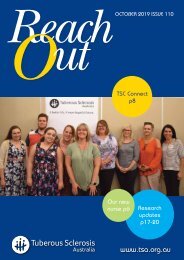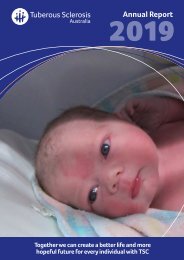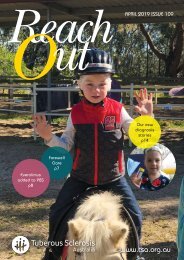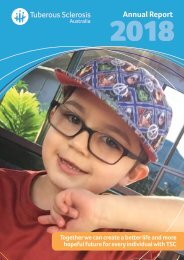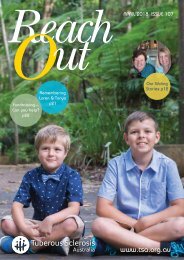Reach Out October 2018
You also want an ePaper? Increase the reach of your titles
YUMPU automatically turns print PDFs into web optimized ePapers that Google loves.
Research<br />
Research News<br />
International topical rapamycin clinical trial<br />
This research developed a topical cream to treat the small tumours<br />
that grow on the face of people with tuberous sclerosis complex.<br />
While these tumours, called angiofibromas, do not cause as<br />
many medical issues as the tumours on internal organs, they<br />
are a constant reminder of how a person with TSC is different to<br />
everyone else.<br />
Our dedicated team at Sydney Children’s Hospital, led by<br />
Drs Orli Wargon and David Mowat, were the only international<br />
site in this multi-centre trial and joined other TSC centres of<br />
excellence around the USA to complete the study. The project<br />
was funded by over $200,000 raised through hundreds of<br />
donations and fundraising efforts of members of Tuberous<br />
Sclerosis Australia (TSA).<br />
This project is the largest randomised clinical trial into this<br />
treatment for angiofibromas. The trial showed that 80 percent<br />
of people using the cream experienced significant improvement.<br />
The study also showed that the medicine is not absorbed into the<br />
bloodstream, which means this cream brings few risks of side<br />
effects. The cream offers a safe and cost-effective alternative to<br />
painful repeated laser surgery that, until recently, was the only<br />
option for these disfiguring growths.<br />
The medicine is not yet fully funded in Australia. TSA will<br />
use these study results in our continued work to improve access<br />
and affordability of the cream. People with TSC can find out more<br />
about how to access the cream on our online information page at<br />
www.tsa.org.au/topicalfaq<br />
A huge thank you to all of the families who participated in the<br />
trial which included many study visits and blood tests.<br />
We also acknowledge the dedication of everyone who<br />
contributed to the fundraising campaign that made this<br />
trial possible – particularly the efforts of the Fundraising<br />
Friends committee including Debbie and Daimon Duffy, Matt<br />
Cashmore, Mark Gold, Nicole Moog, Kathryn Kennedy, Hayley<br />
Hill and Sue Pinkerton.<br />
Koenig, M. K. et al. Efficacy and safety of topical rapamycin in<br />
patients with facial angiofibromas secondary to tuberous sclerosis<br />
complex: The treatment randomized clinical trial. JAMA dermatology<br />
154, 773-780, doi:10.1001/jamadermatol.<strong>2018</strong>.0464 (<strong>2018</strong>).<br />
Australian research into TSC and autism continues<br />
Dr Bec Mitchell continues her valuable work on the DOTS* study<br />
that is increasing our knowledge of the risk factors for autism in<br />
children with TSC and of possible interventions for children at<br />
risk of autism. Dr Mitchell is a developmental paediatrician at<br />
Royal Children’s Hospital in Melbourne and is working with Dr<br />
Simon Harvey and Dr Katrina Williams.<br />
More than 30 children have<br />
been through detailed developmental<br />
assessments and reviews as part of<br />
this project. We are grateful to the<br />
families who have taken the time to<br />
be a part of this.<br />
Dr Mitchell has completed an analysis of existing work in<br />
this area to understand what we can learn by combining results<br />
of multiple small studies. For example, are children who have<br />
seizures more likely to be later diagnosed with autism? Does a<br />
higher number of tubers in a child’s brain increase the child’s risk<br />
of autism? Do the genetic changes in TSC1 or TSC2 mean a child<br />
is more likely to develop autism?<br />
Understanding which children with TSC are at greatest<br />
risk of autism may help these children access earlier<br />
interventions such as parent coaching and speech and language<br />
interventions. We may also learn more about whether there are<br />
specific interventions for these children that can reduce their<br />
developmental delays or their risk of autism.<br />
More than 30 children have been through detailed developmental<br />
assessments and reviews as part of this project. We are grateful to the<br />
families who have taken the time to be a part of this. Thank you to the<br />
Romios family for fundraising for this project in honour of their son<br />
Kristian and also to the University of Melbourne for funding<br />
Dr Mitchell’s PhD through the Leslie Eric Paddle scholarship.<br />
We look forward to sharing more about Dr Mitchell’s work as<br />
it is published.<br />
Watch Dr Mitchell talk about this study and early<br />
development in children with TSC at www.tsa.org.au/DOTS<br />
*Development outcomes of children with tuberous sclerosis<br />
20<br />
<strong>Reach</strong><br />
<strong>Out</strong><br />
OCTOBER <strong>2018</strong> ISSUE 108


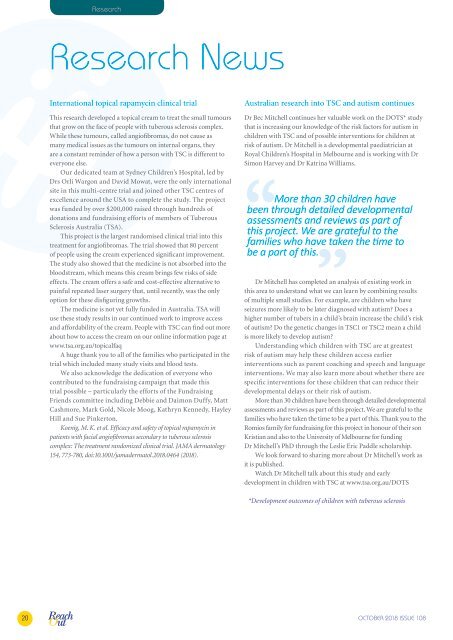


![TSA Reach Out April 2022 [Final]](https://documents.yumpu.com/000/066/687/587/3d369bd665bdb406a759500f62e2cfad0ccb7b3d/47512b4a703265727550565249426664566a727454513d3d/396a524e7354316d3867454b587243526164724c52673d3d.jpg?AWSAccessKeyId=AKIAICNEWSPSEKTJ5M3Q&Expires=1715486400&Signature=AmYcXz%2FZOhpUpAhrJCcbQ6IiIPU%3D)
![TSA AR 2021 [WEB] (1)_FINAL](https://documents.yumpu.com/000/065/886/431/1afb21934ac6c444cd384e5fd7403d62e47080ce/426853747566526573646568546777594b4a4a5734513d3d/547274595943503850786275754544495972536c52513d3d.jpg?AWSAccessKeyId=AKIAICNEWSPSEKTJ5M3Q&Expires=1715486400&Signature=TnDv0LjzqMty0qqrFiv7Mn50ots%3D)

![TSA Reach Out Apr 2021 [WEB]](https://documents.yumpu.com/000/065/442/909/1e583cb2acba0eaa7f1aae53e14a0cf408aa56c4/7871796d694459464d707163324830746459484671673d3d/45356637637a3369494f764f4c3858495549795251513d3d.jpg?AWSAccessKeyId=AKIAICNEWSPSEKTJ5M3Q&Expires=1715486400&Signature=zJOu3HMnRDXpDaQcQfI1zMvbHjQ%3D)




